
BOLETIN GEOLOGICO Y MINERO
metrics 2024
Pioneering Insights in Mineralogy and Environmental Geology
Introduction
BOLETIN GEOLOGICO Y MINERO is a significant academic journal published by the Instituto Geológico Minero de España, focusing on the fields of Geology and Geochemistry. Established in 1980, this journal provides a platform for researchers to disseminate vital studies and findings in the earth sciences, encompassing an array of topics from mineralogy to environmental geology. Despite its Q4 ranking in both Geochemistry and Petrology and Geology categories as of 2023, the journal serves as a resource for emerging research and innovative methodologies in these critical fields, promoting a deeper understanding of geological processes and materials. While currently operating without an open-access model, the journal is committed to advancing knowledge through rigorous peer-review standards. With its roots in Spain, the BOLETIN GEOLOGICO Y MINERO significantly contributes to the European geological research community and remains an invaluable resource for students, professionals, and researchers alike engaged in the pursuit of geological science.
Metrics 2024
 0.21
0.21 0.20
0.20 0.40
0.40 24
24Metrics History
Rank 2024
Scopus
IF (Web Of Science)
JCI (Web Of Science)
Quartile History
Similar Journals
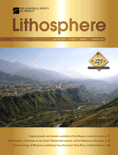
Lithosphere
Transforming Geological Insights into Global Impact.Lithosphere, published by GEOSCIENCEWORLD, is a premier open access journal that has been at the forefront of geological research since its inception. With the ISSN 1941-8264 and the E-ISSN 1947-4253, this journal serves as a vital resource for researchers, professionals, and students interested in Earth and planetary sciences, particularly in the field of geology. Its impressive ranking of Q2 in the 2023 category indicates its vital role in disseminating high-quality, impactful research. The journal’s commitment to open access since 2018 enhances its reach, providing global accessibility to cutting-edge studies that span a diverse range of geoscientific topics, from tectonics to sedimentology. With Scopus Rank #88 out of 321 in Earth and Planetary Sciences, it offers a strong platform for scholars to share their findings and engage with the latest advancements in the discipline. As the journal continues its convergence from 2009 to 2024, Lithosphere remains a crucial publication for those striving to deepen their understanding of Earth's systems.
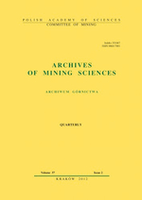
Archives of Mining Sciences
Exploring the depths of geochemical innovation.Archives of Mining Sciences is a peer-reviewed journal published by the Polska Akademia Nauk (Polish Academy of Sciences), dedicated to advancing knowledge in the fields of geochemistry, petrology, geotechnical engineering, and engineering geology. With an ISSN of 0860-7001 and an E-ISSN of 1689-0469, this journal has been a vital resource for professionals and researchers since its inception in 1991. Housed in Poland, the journal serves as a platform for the dissemination of significant research results, technical developments, and case studies, ensuring accessibility to a global audience. Competing in a rigorous landscape, it has achieved a notable Q3 ranking in 2023 within both the Geochemistry and Petrology and Geotechnical Engineering and Engineering Geology categories. As it converges through its years of publication—currently covering the period from 2008 to 2024—the journal maintains a strong focus on fostering innovative research that addresses crucial geological challenges. Its presence in Scopus rankings reinforces its commitment to quality and relevance, making it an essential read for students and professionals seeking to stay at the forefront of mining sciences.

Geosfernye Issledovaniya-Geosphere Research
Unveiling the Dynamics of Our GeosphereGeosfernye Issledovaniya-Geosphere Research, published by TOMSK STATE UNIVERSITY, is a significant addition to the scholarly discourse within the fields of Earth and Planetary Sciences, Ecology, and Geography. With a focus on innovative research and insights that span a broad spectrum of environmental and geographical studies, this journal aims to provide a platform for researchers and students alike to disseminate their findings and discuss pressing issues facing our planet. Though classified in the Q4 quartile for its 2023 metrics, it serves as an important venue for early-career scientists and scholars from the Russian Federation and beyond to contribute to the global dialogue surrounding geosciences. The journal operates with various access options, making it accessible to a diverse audience. It encourages submissions that inspire robust discussion and exploration of topics vital to our understanding of the geosphere and its intricate dynamics. Covering the pivotal years from 2019 to 2024, Geosfernye Issledovaniya-Geosphere Research is poised to enhance its relevancy and impact within the academic community.
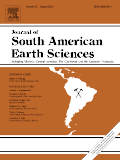
JOURNAL OF SOUTH AMERICAN EARTH SCIENCES
Exploring the Depths of South American GeologyJOURNAL OF SOUTH AMERICAN EARTH SCIENCES is a premier interdisciplinary journal dedicated to publishing high-quality research in the fields of Earth-Surface Processes, Geology, and Paleontology, making it an essential resource for scientists and researchers focused on South American geology and its diverse geological phenomena. Published by Pergamon-Elsevier Science Ltd in the United Kingdom, this journal has been instrumental in disseminating groundbreaking studies since 1988, showcasing contributions that push the boundaries of knowledge in Earth and Planetary Sciences. With an impressive Scopus ranking—positioning it in the 74th percentile for Paleontology and 71st for Geology—this journal not only reflects robust academic quality but also its commitment to addressing critical geological challenges in South America. Researchers will appreciate its objective of advancing understanding of geological processes while providing insights into past, present, and future Earth environments. Although available through traditional subscription models, the journal's vast repository of articles enriches the academic landscape, facilitating the sharing of vital research among professionals, students, and geological practitioners.

Boletin de Ciencias de la Tierra
Advancing Knowledge in Earth and Planetary SciencesBoletin de Ciencias de la Tierra is a distinguished open-access journal dedicated to the field of Earth and Planetary Sciences, published by the Universidad Nacional de Colombia, Sede Medellín. Since its transition to open access in 2006, it has become an essential platform for disseminating high-quality research that addresses critical geological and environmental issues pertinent to Latin America and beyond. With an ISSN of 0120-3630 and an E-ISSN of 2357-3740, the journal aims to promote scientific dialogue and share innovative findings in various areas including geology, geochemistry, and environmental sciences. Although it currently holds a Scopus rank of #184 in the General Earth and Planetary Sciences category, indicating a percentile of only 5, Boletin de Ciencias de la Tierra is committed to fostering a rich academic discourse and enhancing the visibility of scholarly works. Situated in Medellín, Colombia, the journal serves as a vital resource for researchers, professionals, and students looking to explore advancements and participate in the global conversation on Earth sciences.

Geopersia
Bridging Disciplines for a Deeper Understanding of Earth.Geopersia is a prominent academic journal published by UNIV TEHRAN, focusing on the interdisciplinary fields of Earth-Surface Processes, Geology, and Geochemistry and Petrology. With an ISSN of 2228-7817, this journal aims to disseminate high-quality research from 2017 to 2024, showcasing innovative studies that contribute to the understanding of geological phenomena. Despite the absence of an open access model, Geopersia maintains a significant scholarly presence, reflected in its categorization within the Q3 and Q4 quartiles in several related fields for 2023. The journal has garnered attention in the academic community, currently ranked in the 43rd percentile for Earth-Surface Processes and 41st percentile for Geology according to Scopus rankings. Researchers, professionals, and students are encouraged to engage with this valuable resource, which not only promotes comprehensive exploration of geological sciences but also fosters collaboration and discussion among experts across the globe.

GEOSCIENCES JOURNAL
Pioneering Insights into Earth's Complex Systems.Welcome to the GEOSCIENCES JOURNAL, a pivotal publication in the fields of Earth and Planetary Sciences and Environmental Science, proudly presented by the Geological Society of Korea. Established in 1997, this journal has become a prominent platform for researchers, professionals, and students, offering a rich collection of peer-reviewed articles that explore a diverse array of geoscientific topics. With an impressive Q2 ranking in both Earth and Planetary Sciences and Environmental Science categories for 2023, it stands as an essential resource in the academic community. Though it operates under a traditional subscription model, GEOSCIENCES JOURNAL remains dedicated to advancing knowledge through rigorous research. Addressed from its headquarters in Seoul, South Korea, the journal aims to foster a deeper understanding of geosciences, encouraging innovation and collaboration in tackling today’s environmental challenges.

Boletin de Geologia
Fostering Collaboration in the Heart of Geology.Boletin de Geologia is a prominent open-access journal published by UNIV INDUSTRIAL SANTANDER, dedicated to advancing the field of Earth and Planetary Sciences. Since its transition to open access in 2000, this journal has provided a platform for researchers to disseminate their findings and engage with the global scientific community. With an ISSN of 0120-0283 and an E-ISSN of 2145-8553, it is indexed in Scopus and has secured a notable Q3 ranking in the category of miscellaneous Earth and Planetary Sciences as of 2023, reflecting the impact and relevance of its published articles. The journal's geographical scope, rooted in Colombia, allows it to highlight significant geological research pertinent to the region while also contributing to global discussions. Scholars and practitioners interested in innovative research within this field will find Boletin de Geologia an invaluable resource for unlocking knowledge and fostering collaboration in the geological sciences.
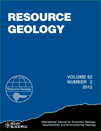
RESOURCE GEOLOGY
Innovative Research for a Sustainable FutureRESOURCE GEOLOGY, published by WILEY, is a peer-reviewed journal that serves as a vital platform for the dissemination of innovative research in the fields of geology and geochemistry. With an ISSN of 1344-1698 and e-ISSN 1751-3928, the journal has steadily contributed to the academic community since its inception in 1996, continuing through its planned convergence in 2024. With a Q3 ranking in both Geochemistry and Petrology and Geology categories, RESOURCE GEOLOGY is positioned within the competitive landscape of Earth and Planetary Sciences, ranked 164th and 93rd in its respective categories on Scopus, reflecting its significant contribution to the body of knowledge in these fields. While not an open-access journal, it provides access to essential research that advances our understanding of natural resources and geological processes. The journal is dedicated to publishing high-quality articles that appeal to researchers, professionals, and students looking to deepen their insight into the intricate interplay between geological phenomena and resource management.
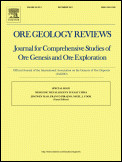
ORE GEOLOGY REVIEWS
Exploring the Depths of Ore DepositsORE GEOLOGY REVIEWS is a premier academic journal published by Elsevier, renowned for its influential contributions to the fields of Economic Geology, Geochemistry, and Petrology, and Geology. With its esteemed Q1 ranking across these disciplines in 2023, it occupies a leading position in shaping scholarly discussions and advancements within the geological sciences. With an impressive Scopus ranking—47th in Earth and Planetary Sciences for Geology, and among the top 40 in Geochemistry and Petrology—this journal serves as an essential resource for researchers, professionals, and students committed to advancing knowledge in ore geology. Having transitioned to an Open Access model in 2022, ORE GEOLOGY REVIEWS enhances the accessibility of high-quality research, promoting wider dissemination and engagement with cutting-edge findings from 1986 to 2024. As a valued publication addressing the intricacies of ore deposits and geochemical processes, it aims to foster interdisciplinary collaboration and innovation in the field.